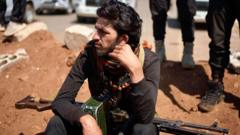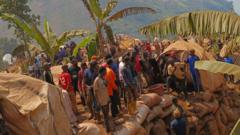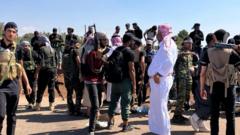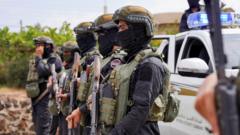Amid ongoing concerns over the fragile ceasefire in Suweida province, clashes between the Druze community and Bedouin militia have resulted in significant loss of life and left the region in a state of instability. Journalists reaching within a close proximity report on the tense atmosphere, marked by military presence and desperate pleas from affected groups.
Ceasefire Holds in Tense Suweida as Sectarian Violence Pressures Syria's Stability

Ceasefire Holds in Tense Suweida as Sectarian Violence Pressures Syria's Stability
Fragile peace in Syria’s Suweida province as tensions simmer between Druze and Bedouin communities following deadly clashes.
The BBC has reported a precarious ceasefire in Suweida, where sectarian violence between Druze fighters and Bedouin tribesmen has recently erupted, resulting in over 1,000 casualties. While the Syrian government has deployed troops to enforce the truce, the situation remains volatile and uncertain.
On a recent attempt to enter Suweida, our team came dangerously close to the city, stopping six miles out due to threats of sniper fire from Druze factions. Abandoned Druze villages now lie under the authority of government forces, with the remnants of violence evident—burnt shops littering the streets and shell casings scattered throughout.
Despite the deployment of government troops to stabilize the area four days prior, sporadic groups of Bedouin fighters, identifiable by their traditional dress, gathered defiantly near the roadside, openly expressing their willingness to resume fighting if the ceasefire collapses. Their demands center on the exchange of injured tribesmen they claim are being held in the city.
Interviews with local fighters reveal rising frustrations, with one Bedouin leader stating, “If the Druze don’t adhere to the agreement, we will return to Suweida again—even if it becomes a cemetery.” This sentiment highlights the deeply entrenched animosities between the communities, especially amid allegations of abuses carried out by government troops.
In the backdrop, humanitarian efforts struggle against the chaos. Amidst shortages, the Syrian Red Crescent managed to evacuate some wounded individuals from Suweida; however, medical resources are critically low. The dire conditions in local hospitals paint a grim picture, with severe injuries among soldiers and civilians alike.
“I want to make something clear,” recounted Ahmed, a soldier who was injured in the recent hostilities. His chilling description of the scenes he witnessed emphasizes the atrocities that have unfolded within the province.
As local officials work towards reconciliation, hopes for a peaceful resolution seem overshadowed by the ongoing strife. Raed al-Saleh emphasized the need for unity and collective effort among communities to address the ongoing challenges and seek long-term peace.
The outlook for Suweida and, by extension, Syria, hangs in a tenuous balance as communities bear the heavy toll of conflict and uncertainty.
On a recent attempt to enter Suweida, our team came dangerously close to the city, stopping six miles out due to threats of sniper fire from Druze factions. Abandoned Druze villages now lie under the authority of government forces, with the remnants of violence evident—burnt shops littering the streets and shell casings scattered throughout.
Despite the deployment of government troops to stabilize the area four days prior, sporadic groups of Bedouin fighters, identifiable by their traditional dress, gathered defiantly near the roadside, openly expressing their willingness to resume fighting if the ceasefire collapses. Their demands center on the exchange of injured tribesmen they claim are being held in the city.
Interviews with local fighters reveal rising frustrations, with one Bedouin leader stating, “If the Druze don’t adhere to the agreement, we will return to Suweida again—even if it becomes a cemetery.” This sentiment highlights the deeply entrenched animosities between the communities, especially amid allegations of abuses carried out by government troops.
In the backdrop, humanitarian efforts struggle against the chaos. Amidst shortages, the Syrian Red Crescent managed to evacuate some wounded individuals from Suweida; however, medical resources are critically low. The dire conditions in local hospitals paint a grim picture, with severe injuries among soldiers and civilians alike.
“I want to make something clear,” recounted Ahmed, a soldier who was injured in the recent hostilities. His chilling description of the scenes he witnessed emphasizes the atrocities that have unfolded within the province.
As local officials work towards reconciliation, hopes for a peaceful resolution seem overshadowed by the ongoing strife. Raed al-Saleh emphasized the need for unity and collective effort among communities to address the ongoing challenges and seek long-term peace.
The outlook for Suweida and, by extension, Syria, hangs in a tenuous balance as communities bear the heavy toll of conflict and uncertainty.


















